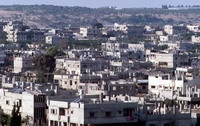Israel complicates plan to relaunch peace talks with Gaza
Israel considers Gaza Strip an "enemy entity" and is going to cut utilities to the territory, complicating the U.S. plan to relaunch peace talks aimed at establishing a separate Palestinian state in Gaza and the West Bank.

Israel made the provocative decision hours before U.S. Secretary of State Condoleezza Rice arrived for talks setting up what President George W. Bush hopes will be a pivotal international Mideast peace conference this fall. Rice neither endorsed nor criticized Israel's move.
Israel did not announce a date for cutoff of services. The decision is likely to reinforce perceptions among Palestinians and their Arab backers that Israel will do as it sees fit regardless of the cost to civilians, and that the U.S. will not block Israel's hand.
Rice said the United States is trying to help both sides reach "common understanding," but she did not say if the U.S.-sponsored peace meeting will address the hardest issues in the six-decade conflict between Israelis and the Palestinians, including the final borders of a Palestinians state.
The United States has not said exactly what it wants to achieve from the summit, nor who will attend.
Rice wants to recruit Arab states to reinforce the Palestinians in any deal they cut with Israel, but the peace session will carry little weight if key regional players such as Saudi Arabia choose to sit it out. The session also has little chance of success if Israel is seen as unwilling to make hard concessions to the Palestinians, and the United States is seen an unable to force Israel's hand.
The U.S.-sponsored conference is meant to invigorate peace efforts that largely lay fallow during Bush's presidency, and set clear guidelines for formation of a Palestinian state.
The Gaza designation overshadowed any public talk of peace prospects as Rice began two days of meetings with Israeli and Palestinian leaders.
Israel said the cutbacks are meant to force Palestinian militants in Gaza to halt Palestinian rocket fire on Israeli towns from launching sites in Gaza. The decision lets Israel cut electricity, water and other services that the impoverished, crowded coastal territory depends on Israel to provide.
The "enemy entity" designation could open the way for the most severe retaliatory measure yet. Israel has been carrying out airstrikes and limited ground strikes. It also has sealed Gaza's borders, halting trade in and out of the area, while permitting little more than humanitarian aid into the area.
Hamas militants who hold de facto control in Gaza have not been directly involved in the rocket attacks, but the movement has done little to halt the fire. Israel says it holds the group responsible.
Rice tried to tread carefully at a press conference with her Israeli counterpart, Foreign Minister Tzipi Livni. Grim-faced, Rice said the United States will not turn its back on civilians in Gaza, and added that Hamas "is a hostile entity to the United States as well."
The Israeli designation covers all of Gaza, not just Hamas militants who took control of the territory in June. The United States and Israel regard Hamas as a terrorist organization and refuse to deal with it.
Livni said Israel was not obliged to deliver anything to Gaza beyond humanitarian aid.
"When it comes to the humanitarian needs, we have our own responsibilities," Livni said. "All the needs which are more than humanitarian needs will not be supplied by Israel to Gaza Strip."
Livni said the decision is legal, but international aid groups called it unacceptable to blame civilians for the actions of rogue militants.
Gisha, a human rights group that works for greater freedom of movement in Gaza, called the action "immoral and illegal, constituting prohibited collective punishment of civilians."
Palestinian President Mahmoud Abbas, the moderate leader on whom Rice and Israel have pinned reinvigorated hopes for peace, quickly condemned the Israeli move.
"This oppressive decision will only strengthen the choking embargo imposed on 1.5 million people in the Gaza Strip, increase their suffering and deepen their tragedy," Abbas' office said in a statement.
Abbas is locked in a bitter rivalry with Hamas, which overran his forces from his Fatah movement and seized control of Gaza. The takeover ended more than a year of paralysis in Palestinian politics, as Fatah and Hamas vied for primacy in a divided government and international aid dried up.
Abbas has installed a new government in the larger and more populous West Bank, but still claims authority over Gaza. An independent Palestinian state would include both territories, which lie on either side of Israel.
Rice met with a long list of Israeli officials on Wednesday, including the defense chief, Ehud Barak, who has hinted that Israel may have to relaunch military operations in Gaza more than two years after a unilateral pullout of Israeli forces and settlers.
Rice was seeing Abbas and other West Bank Palestinian leaders on Thursday.
Subscribe to Pravda.Ru Telegram channel, Facebook, RSS!




